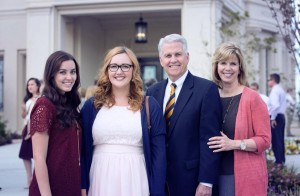
The prompting Aleksandra Modzelewska felt on the day she met the missionaries of The Church of Jesus Christ of Latter-day Saints was not the first sacred experience in her life.
Modzelewska, who was born in Warsaw, Poland, said her spiritual adventure began when her mother died in January 2010, six months before she met sister missionaries Laurel Hulme, Stacey Helfrich and Kathy Powels for the first time.
Modzelewska wasn’t religious at the time, but she distinctively remembers feeling peace when her mother’s casket went into the ground. She saw the grief in her father’s and her sisters’ faces, but she felt something else.
“I felt like someone was literally holding me and protecting me from falling down,” she said. “I felt like my mother was everywhere but not there in that casket.”
Her mother’s death was unexpected. After a car accident, she was in a coma for 10 days before suddenly dying.
The experience prompted Modzelewska to ponder the meaning of life. She took philosophy, sociology and psychology courses at the University of Silesia in her search for answers. She also began studying the New Testament for 20 minutes every day.
Modzelewska searched for answers to questions about where she came from, why she was on earth and where she should go.
“It is so funny because that is how you usually start teaching the Plan of Salvation,” she said. “Essentially these were my questions.”
She was walking to work in July 2010 when she felt prompted to look to the side of the street. She noticed a whiteboard with a question written on it.
LDS missionaries in Poland are discouraged from proselytizing, so they found other means of reaching out to people. Laurel Hulme, then a sister missionary, set up whiteboards asking about people’s favorite books and who Joseph Smith was to encourage people to approach them.
“One day, the message on our board was ‘What are signs that God loves us?'” Hulme said. “Aleksandra was one of the people who approached our board.”
Although Modzelewska said the question was written in “really broken Polish,” it didn’t matter.
“I really felt something powerful when I looked at the board and saw the question,” she said. “I was really prompted to write something on the board.”
Despite her rush, Modzelewska stopped at the whiteboard and talked with the missionaries.
“The missionaries made a huge impression on me. They spoke pretty good Polish, they were my age and boldly testified of a loving God and Jesus Christ,” Modzelewska said.
Modzelewska first had no intentions of becoming Mormon, despite the feelings and questions that arose after her mother died. She went to the first meeting because she wanted to become friends with the missionaries.
“The couple times I went to the discussions with them, I did not go there to get baptized. It did not even cross my mind,” Modzelewska said.
Modzelewska’s family and friends were not pleased when she started seeing the missionaries. They thought she lost her mind and that it was just a way for her to cope with her mother’s death.
Her friends at work found all the anti-Mormon materials they could to discourage her from getting baptized. But Modzelewska kept taking the discussions and did what she felt was right in spite of the pressure.
Stacey Helfrich, another missionary, taught Modzelewska from the start of her investigation of the church until her baptism. Helfrich said Modzelewska’s attitude was unlike any investigator’s that she had seen.
“She was like a sponge soaking up every lesson so intensely,” Helfrich said. “She took pictures of our diagrams and took notes in a notebook about the things we were teaching her.”
Helfrich said Modzelewska was “extremely excited about the gospel” and her progression “was very fast, even though some gospel principles did not settle well with her until she had a testimony for herself, such as tithing.”
Angela Smith, another missionary who taught Modzelewska, said she “truly was a golden investigator.”
Modzelewska, like many of her relatives, was a member of the Roman Catholic Church before she became a Mormon. Although she never questioned religion itself, she was skeptical of some of the things the Catholic Church taught.
Modzelewska was baptized three months after meeting the missionaries. She changed her baptism date three times, finally deciding on Oct. 16, 2010 — her mother’s birthday. She wanted it to be special.
Modzelewska said no other members of her family converted with her — it was actually just the opposite. Her sisters turned into atheists after their mother died. Modzelewska wasn’t surprised. She said she feels it is a typical attitude to have after such a trial.
What did surprise her was her own attitude toward life and religion after that experience.
“It was amazing to me that I somehow was able to find strength, balance and spiritual peace to endure that trial,” Modzelewska said.
A year after converting to the LDS faith, she had the chance to baptize her late mother by proxy.
“I did all of the ordinances for her and I know that she accepted the gospel. So theoretically, there are two of us,” Modzelewska said.
Modzelewska said she knows in retrospect that everything happened for a reason.
She believes the Spirit guided her along the way. She recognizes the blessings she received from joining the church and serving a full-time mission in Romania. And now her family and friends see that she is happy and know she made a good decision.
“Today, I cannot imagine my life without the gospel and LDS standards,” Modzelewska said. “I learned to live by faith, not by fear, and for that I am very grateful.”




